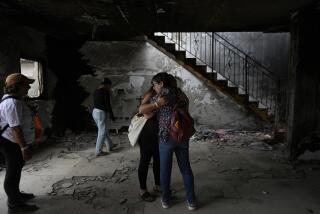The Rough Road of the First 50 Years
- Share via
Today marks the 50th anniversary of Israeli statehood--fulfilling the aspirations of Jews throughout the world. The road to statehood was often harsh. Several of its defining moments could have impeded or even prevented Israel’s birth and growth.
It was not the Holocaust, but 20 years of Jewish immigration to Palestine and the establishment of Jewish national institutions there that enabled the Jewish state to come into being. Britain ruled Palestine since WWI when, in the words of the Balfour Declaration, “his majesty’s government” viewed favorably the “establishment in Palestine of a national home for the Jewish people.” As a result of British policy, a Jewish population of 50,000 grew to half a million by 1939, and the Jewish authorities in Palestine governed their own people--rather as Yasser Arafat’s Palestinian Authority governs its own people today in all seven Arab towns and more than 400 Arab villages.
After WWII, the newly created United Nations voted to partition Palestine into a Jewish and an Arab state. The Jews accepted partition as the price of statehood, even though Jerusalem was to be excluded from both the Jewish and Arab entities. The Arabs rejected any form of partition whatsoever. On May 14, 1948, as British troops left, the leader of the Jews of Palestine, David Ben-Gurion, proclaimed independence. In an immediate response, American recognition was issued from Washington a mere 11 minutes after the new state was proclaimed in Tel Aviv. This was at President Truman’s personal urging.
There was scarcely time for rejoicing. On the day after Israel’s declaration of independence, the Syrian and Lebanese armies attacked from the north. Trans-jordan invaded from the east and Egypt from the south. Iraqi troops advanced into the very center of the country.
Israel held its ground against these five armies. But it took more than a year of harsh fighting before the War of Independence ended. Israel had proved it could defend itself. But conflicts between Israel and its neighbors continued. In 1956, Egypt seized the international waterway of the Suez Canal and moved troops into the Sinai. War was imminent. The campaign itself lasted a week. Israel defeated Egypt in Sinai. After only eight years of statehood, Israel had stood up to its most hostile neighbor. But its neighbors still sought to destroy the Jewish state.
The Six-Day War in 1967 and the Yom Kippur War in 1973 were intended by the Arab states to be severe defeats. They proved instead to be victories for Israel. But the outcome of neither war was inevitable. Each bore significant risk. Each had a high cost in soldiers’ lives. In 1979, Israel and Egypt made peace, but terror across the northern borders continued. In 1982, Israel invaded Lebanon, the source of most of these terror attacks. As a result of the war, the Palestine Liberation Organization, headed by Arafat, was forced to leave Lebanon for Tunis.
After the war of 1982, Israel suffered from unprecedented inflation. Since then, the United States has made an enormous economic contribution to Israel, more than $3 billion a year.
In addition to wars, the burdens of immigration were enormous. “Absorbing these immigrants would have been beyond the ability of a well-established, prosperous country, let alone one newly born and struggling to defend itself,” Israeli President Chaim Herzog reflected. Yet every effort was made to find the newcomers food, work and an integral place in society.
Zionism has striven for a hundred years to ensure that the Jews and Arabs of the small strip of land between the Mediterranean Sea and the River Jordan--a strip of land never more than 60 miles wide--find a way of accepting each other’s right to live and prosper. The Oslo accords of 1993, which were a triumph on Israel’s side for its then foreign minister (and later prime minister) Shimon Peres and his negotiating team, were part of a half-century of what is now known as the “peace process.”
Israel has achieved much in 50 years, despite the constant threat of war and violence, including in the past few years several horrendous suicide bomb attacks by Arab extremists. Internal conflicts also have been considerable. But there is a vibrancy and energy in Israel that no visitor can fail to notice. There is a free press, vigorous public debate and fiercely outspoken political and parliamentary opposition. The quality of day-to-day life has reached a high standard. The Jewish festivals provide a focus throughout the year for family, school and community celebration.
Winston Churchill once said, “The future, though imminent, is obscure.” In its first 50 years, Israel has found its way through many dangers. Today, as the state reaches its 50th year, a sharp struggle is taking place between different and often conflicting attitudes. Extreme and even racist attitudes reflect a violence within the society that culminated in the assassination of Prime Minister Yitzhak Rabin by a fellow Jew less than three years ago. There have been Jewish death threats against the Jewish head of the Supreme Court, a Holocaust survivor. Yet the vision of a forward-looking, democratic and human Israel remains. That vision surely will triumph.
More to Read
Sign up for Essential California
The most important California stories and recommendations in your inbox every morning.
You may occasionally receive promotional content from the Los Angeles Times.













